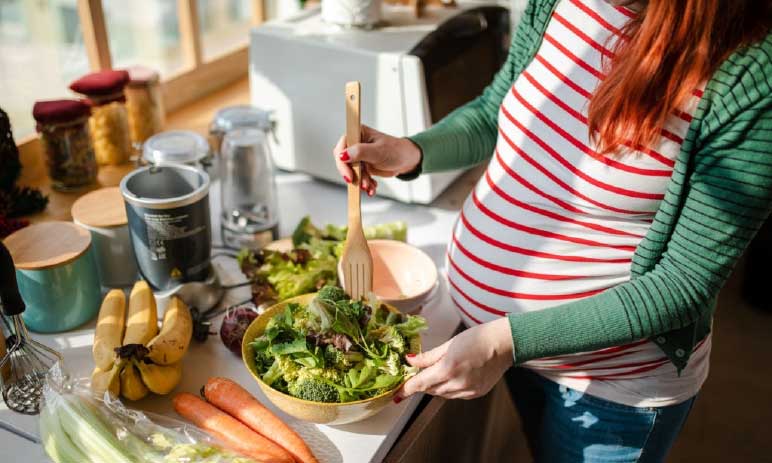Broccoli during pregnancy is among the best ways to keep up your nutrition and maintain good health during this time. Because, like most dark, leafy green vegetables, broccoli also contains rich amounts of fiber, vitamins, calcium, iron and so on, the benefits of broccoli during pregnancy are undeniable.
So, if you are asking yourself “is it good to eat broccoli during pregnancy?” here we are going to address just that, and will also try and list some of the benefits of broccoli during pregnancy.
Nutritional Profile Of Broccoli
As mentioned above, broccoli has a rich nutritional profile, much like other dark and leafy green vegetables. They also contain phytochemicals and antioxidants, and therefore, broccoli is also a part of our list of superfoods during pregnancy.
They contain a great deal of fiber, and rich amounts of Vitamin A, Vitamin K, Vitamin C, Iron, Folate, Calcium, and Potassium, and as such, boast a great deal of health benefits and mitigate no short amount of risk during pregnancy.
Is It Safe To Eat Broccoli During Pregnancy?
With the wide range of nutrients and benefits broccoli, provides, it is absolutely safe to consume it during pregnancy. There is absolutely nothing to worry about, as long as it is fresh and consumed in adequate amounts, and not in excess. It is even safe to consume raw broccoli during pregnancy, if it is washed properly and consumed fresh.
Health Benefits Of Eating Broccoli During Pregnancy
Having an abundance of nutrients and being considered a superfood, broccoli has no shortage of health benefits. Consuming a healthy amount of it regularly can prove to provide a plethora of health benefits to you during the course of your pregnancy. You may even end up craving broccoli during pregnancy! Some of these health benefits are as follows:
1. Helps regulate sugar levels
During pregnancy, it can be quite easy to let your sugar levels get out of hand. With your pregnancy diets and cravings, and the reduced production of insulin within your body, this can pose the risk of contracting Gestational Diabetes.
This happens when your body is incapable of producing adequate amounts of insulin in order to break down the sugars you consume. Broccoli helps regulate the levels of sugar within your body, thus reducing the risk of Gestational Diabetes quite drastically.
Calculate Due Date With LMP
Related Reading: Eating Jaggery (Gur) During Pregnancy
2. Eating broccoli during pregnancy can improve immunity

While pregnant, you are susceptible to many kinds of infections, as your immune system is weakened from having to dedicate more of your body’s resources to take care of your baby. Some of these infections may even affect the baby, and hence it is important that you make sure that neither you nor your baby is infected.
Broccoli helps greatly and is one of the simple ways to boost your immunity during pregnancy, largely due to the presence of beta-carotene and selenium, and so, dramatically reduces the chance of getting infected.
3. Helps prevent constipation
Constipation is a very common, albeit very uncomfortable phenomenon in pregnant women. Understandably, as the body is undergoing many substantial changes and hormone levels are fluctuating.
This, combined with the intake of iron supplements can very easily have a negative impact on the stimulation of your bowels, causing constipation. Broccoli, containing a large quantity of both soluble and insoluble fiber and amazing water retention, can easily help trigger bowel movements and help against constipation.
Related Reading: 18 Home Remedies For Constipation During Pregnancy
4. Helps increase strength of bones
The drastic physical changes that one undergoes during pregnancy can lead to many problems affecting her bones, like Osteoporosis, which can quite dramatically weaken your bones.
This can be prevented, and your bones can be strengthened by consuming broccoli, as it is rich in zinc, calcium, magnesium, and phosphorous – all of which play an important role in making your bones strong and healthy.
5. Helps protect skin
Pregnancy can leave greatly increase the sensitivity of your skin, leaving it susceptible to skin damage and even cancer with prolonged exposure to UV radiation. As you can imagine, this can be quite dangerous and so it is crucial that you protect yourself from it.
Broccoli, being rich in Vitamins such as A, B, E, and K helps maintain a healthy skin structure and so not only protects you from these dangers but may even bring out a certain glow in your skin. Check out some easy tips for glowing skin during pregnancy.
6. Helps protect against anemia

As anemia is a well-known occurrence in pregnant women, you are likely already taking preventive measures against it by taking supplements of Iron and Folic acid. Given a choice, however, it is always better to opt for the more natural option, and broccoli is a rich source of both iron and folic acid, making it an amazing deterrent against anemia.
However, if you are taking supplements and consuming a healthy amount of broccoli, it is advised that you consult your gynecologist to better strike a balance between supplements and diet.
7. Helps improve eye health and maintain vision
Broccoli contains rich amounts of beta-carotene and Vitamin A, both of which play a huge role in your eye’s health and maintaining good vision. Consuming broccoli, therefore, helps maintain good vision and even helps protect you from contracting any eye-related problems.
Related Reading: Top 10 Protein-Rich Foods For Pregnancy
8. Helps protect from allergies
Allergies are an all-too-common occurrence in people, much fewer women who are pregnant, with further weakened immune systems. In extreme cases, they can prove to be quite grievously harmful to both you and your child.
The rich amounts of Vitamin C in broccoli help prevent this as it plays a crucial role in relieving many symptoms such as sneezing or blocked sinuses. That being said, broccoli itself may cause allergic reactions in a few, and show symptoms such as rashes.
It is therefore advised that you proceed with caution if you think you are allergic, and consult your gynaecologist just to be safe.
Related Reading: 12 Relevant Things To Know Before Choosing A Gynaecologist
9. Helps reduce the risk of cancer
This is perhaps one of the most important benefits of consuming broccoli, as cancer is always a very real risk for anyone, and therefore it is vital that you take steps to prevent it. This is all the more important during pregnancy when your child’s safety is entirely dependent on yours.
Though broccoli is not exactly a cure for cancer, it can go a long way in preventing it, as broccoli is rich in phytochemicals. These are specific elements having anti-cancer properties, which go a long way in cancer prevention. Hence, broccoli can be a great deterrent against cancer for both you and your child, throughout your lives. Garlic also helps in prevention of cancer, know more about garlic during pregnancy.
Risks And Precautions Of Eating Broccoli During Pregnancy

As it is a superfood rich in a great amount of nutrients, consuming broccoli does not pose a number of risks. That being said, the risks aren’t absent entirely either. Some of the risks of consuming broccoli are:
- Allergic reactions, often when consuming an excess quantity of broccoli. This is most often seen in the form of rashes on the skin
- Gas and other stomach-related problems from consuming an excessive amount of broccoli
- A great many health problems may occur if the broccoli is not fresh
There are, however, quite a few precautions you can take to mitigate these risks:
- Only consume fresh and healthy broccoli –always pick dense, fresh, and dark green colored broccoli heads with a firm stalk and stem. Avoid buying wilted or dried broccoli florets
- Consume broccoli in moderation – having too much broccoli can also cause may problems as stated earlier, like gas or allergic reactions
Conclusion
Though it is not entirely free of risk, broccoli is certainly a must-have food in your pregnancy diet. Being a superfood, it provides a plethora of health benefits and nutrients that help prevent a great deal of health problems for both you and your baby. However, it is important that you consume it in moderation, make sure you consume only fresh broccoli, and consult your gynecologist if needed in order to reduce some of its risks.
FAQs-
Consuming a moderate, healthy amount of broccoli during pregnancy is completely fine. It even goes a long way in helping prevent constipation and can provide excellent bowel stimulation due to its high fiber content.
However, as stated earlier, consuming excess amounts of broccoli can have an adverse effect on your body, and can end up causing not just gas, but often other stomach-related problems as well.
Broccoli can be prepared and consumed in a number of ways. There is no one specific way in which to prepare broccoli. Nutrition aside, it is also one of the most versatile ingredients that may be included with almost any dish.
A few common ways in which to prepare broccoli during pregnancy are:
By steaming chopped-up broccoli – this can be consumed as it is, or even added to a salad or as a pizza or pasta topping
Stir fry chopped up or whole broccoli florets with other vegetables, garlic, herbs, and olive oil to make a healthy side dish
Make a delicious, healthy dip/spread out of broccoli to make a healthy sandwich or spread on parathas
Add fresh, chopped up broccoli florets to soup for some rich flavor

